Bobby Jindal reports raising $597K for presidential race
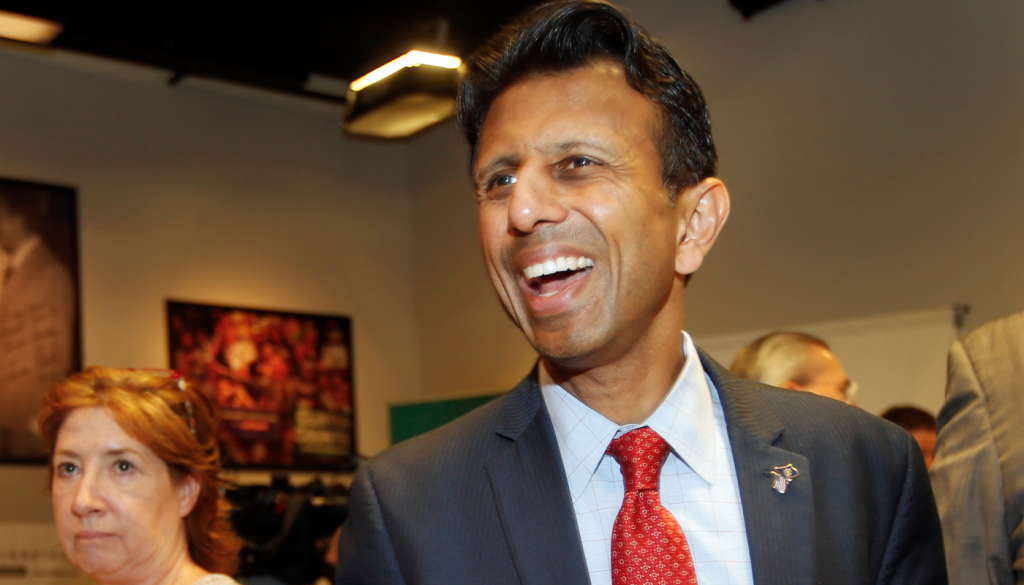
Louisiana Gov. Bobby Jindal, a Republican presidential candidate, has raised about $579,000 for his campaign. That’s according to financial reports his campaign filed Wednesday with federal regulators. Most presidential candidates are due to file similar documents by midnight. The GOP field is expected to have 17 candidates. Jindal announced his candidacy June 24 and raised the money in about a week. Documents show he is drawing most of his contributions from a base of supporters in Louisiana. The reports cover through the end of June. The report shows he spent about $65,000 in that time. Republished with permission of The Associated Press.
GOP White House hopefuls scramble for anti-abortion vote
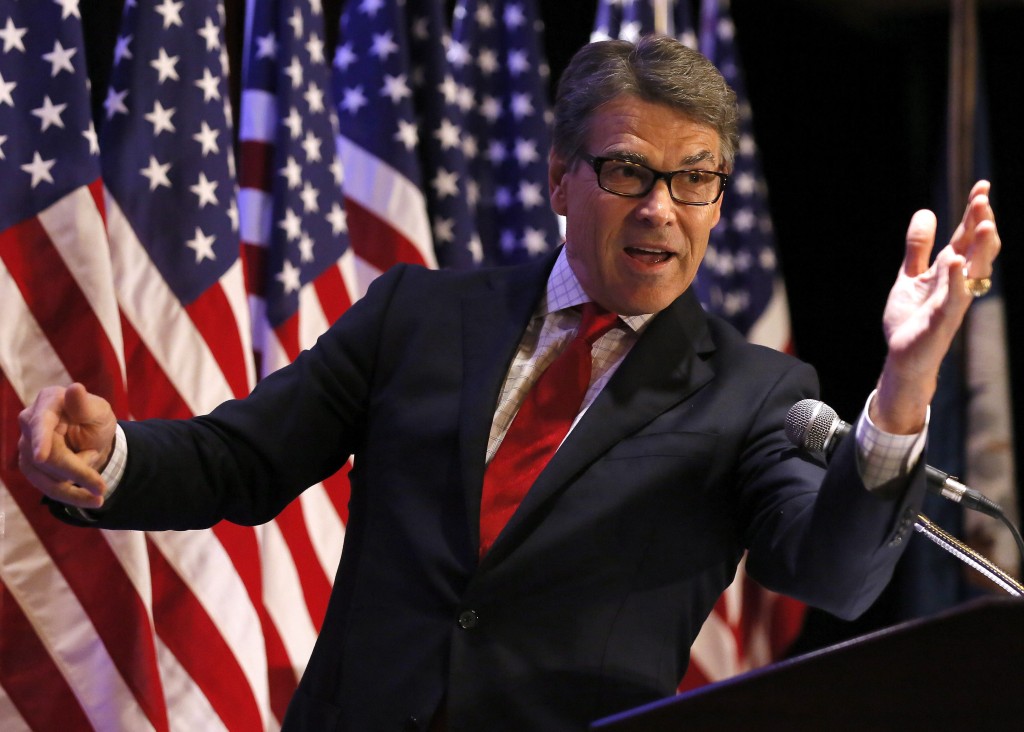
Trying to distinguish themselves in front of an important group of social conservative activists, Republican White House hopefuls on Friday used the National Right to Life Convention to share personal stories and detail the abortion restrictions they’ve helped write into law. The question now is whether the scramble helps or hinders an anti-abortion movement seeking unity as Republicans look to win back the presidency next November. National Right to Life Political Director Karen Cross urged the assembly to “make a decision right now that the issue of life trumps all else.” “There is no such thing as the perfect candidate,” she warned. Carol Tobias, the group’s president, argued in an interview that President Barack Obama benefited in both of his national victories from social conservatives who didn’t back John McCain in 2008 or Mitt Romney in 2012. “The quickest way to defeat a pro-lifer,” Tobias said, “is to fall in love with your candidate and then get your feelings hurt when they don’t win the nomination.” The candidates gave repeated nods to those sentiments, praising each other and hammering Democratic favorite Hillary Rodham Clinton, who supports abortion rights. Still, they spent most of their energy asserting their own conservative supremacy on the issue. Santorum boasted of how he sponsored the federal law that bans certain late-term abortion procedures after initially soft-pedaling his abortion stance because of Pennsylvania’s closely divided electorate. “You know me; there’s no quit in this dog,” he said. “Go ahead and nominate somebody who’s just going to go along. Then try to convince yourself you’ll make a difference.” Rick Perry predicted the next president will nominate as many as four Supreme Court justices — who could presumably overturn the 1973 Roe v. Wade ruling that legalized abortion nationally. “If I have the opportunity to put justices on the Supreme Court, they will not be squishy,” the former Texas governor said. Florida Sen. Marco Rubio explained his abortion opposition as “inseparable from the effort to reclaim the American dream … for every child,” and recalled abortion restrictions he helped pass as speaker of the Florida House of Representatives. Jeb Bush, whose tenure as Florida governor overlapped Rubio’s speakership, mentioned some of the same laws in a video presentation. He did not physically attend the convention. Ben Carson, a retired neurosurgeon, has never held elected office, but he blasted abortion providers as “evil.” Tobias said her group doesn’t wade into primaries in part because it’s hard to find meaningful distinctions between candidates, though she acknowledged the campaigns will find them. New Jersey Gov. Chris Christie supported abortion rights earlier in his career, something he generally avoids talking about now. Wisconsin Gov. Scott Walker celebrated passage of a new state ban on most abortions beyond the 20th week of pregnancy. Yet late in his 2014 re-election campaign, he aired an ad in which he affirmed his abortion opposition while emphasizing that Wisconsin law “leaves the final decision to a woman and her doctor.” South Carolina Sen. Lindsey Graham has sponsored a ban on abortions after 20 weeks. But some conservatives blast him for voting to confirm Obama’s two Supreme Court nominees. Tobias said those details sometimes matter to abortion opponents, but she maintained that nitpicking is counter-productive. For many anti-abortion voters, she said, choosing a primary candidate is about “trust” and “personal feel” rather than policy. The candidates’ approaches here suggest they understand that. Rubio and Perry talked about seeing their children on ultrasounds during pregnancy. Carson, a retired neurosurgeon, talked about how he gravitated to pediatric surgery because of how much he values children. Louisiana Gov. Bobby Jindal talked Thursday night about having to defend his anti-abortion stance in his interviews for medical school. Santorum tells the story of doctors advising that his daughter, Bella, who suffers from a rare genetic disorder, would not have a good quality of life and could die as an infant. “There is no better way to preach the gospel of life,” Santorum said Friday, than to have school-age Bella “in the White House.” Public opinion, meanwhile, remains divided. An Associated Press-GfK poll conducted in January and February found that 51 percent of Americans think abortion should be legal in all or most cases, while 45 percent think it should be illegal in most or all cases. At NARAL Pro-Choice America, a leading abortion rights advocacy group, Sasha Bruce said that means Republicans “are fighting over a slice of the minority,” putting them at a disadvantage in November. Tobias countered that among voters who rank abortion as a key issue in deciding on a candidate, “we win a majority of them.” Her movement’s job, she said, is to increase the share of voters who cast their vote “based on the life issue. If we do, we win.” Bruce said her organization is focused on educating general election voters about the success abortion opponents have had limiting abortion access through state-by-state restrictions. “They aren’t overturning Roe v. Wade, but they’re just chipping away,” she said. Republished with permission of The Associated Press.
Overflowing GOP presidential field has Fox News in demand
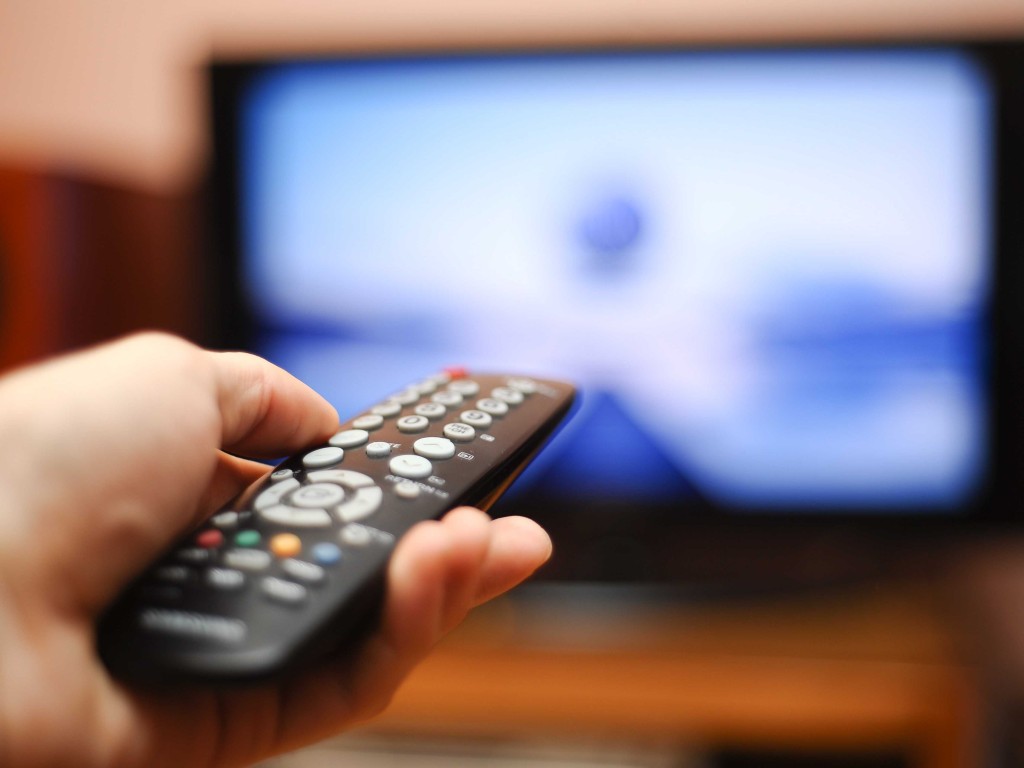
It’s the stuff of Republican nightmares: Fox News runs out of advertising time. But in an election bursting with money from an expected 17 Republican presidential candidates and dozens of outside groups supporting them, NCC Media, the company that handles placement of political ads for most of the country’s cable systems, is already working out the puzzle of how to accommodate everyone. “Fox is a revenue driver,” said Tim Kay, NCC’s director of political strategy. “It’s extremely popular as the way to reach Republican primary voters.” He added: “What we’re waiting to see is, is everyone going to want Fox News, or are they branching out to different channels to try to capture some of those same demographics?” It’s not just Fox News. Broadcast stations in the early primary voting states of Iowa, New Hampshire, South Carolina and Nevada are preparing for a 2016 onslaught — which they welcome, because presidential ads boost their bottom lines every four years. For television viewers? Welcome back to campaign season. If you live in New Hampshire or Iowa, you’re already seeing the smiling faces of at least four Republican presidential candidates. Beginning Thursday, Ohio Gov. John Kasich will be talking in a commercial about how he learned from his father, “Do your best to look out for other people.” The ad, which costs about $1 million to broadcast across New Hampshire, was paid for by New Day for America, an outside group backing the governor, who has yet to make his candidacy official. Ex-Texas Gov. Rick Perry and Louisiana Gov. Bobby Jindal, both declared GOP presidential candidates, have been introducing themselves to Iowans thanks to ads put up by outside groups helping them. Texas Sen. Ted Cruz‘s campaign put a small run of commercials on the air soon after he announced his candidacy in late March. All of this with the nation’s first primary contest, in Iowa, more than 200 days away. Still, early advertising gets the candidates better known and can help presidential aspirants who are struggling near the bottom of the pack, said Will Feltus, a media researcher and planner at National Media who worked on George W. Bush‘s two presidential elections. “There’s a perception that you’re not real until you’re on television,” Feltus said. “TV has a very positive effect on supporters, on donors and on potential donors.” No one in the 2016 GOP class has focused on TV more than Florida Sen. Marco Rubio, whose campaign has placed orders for more than $12 million in ads that would start at the end of this year and air in Iowa, New Hampshire and other early primary states. “We raise money for one simple reason,” Rubio told The Associated Press while campaigning Wednesday in Iowa. “And that is to be able to pay for an organization that can deliver our message, and also be able to buy access and airtime to be able to communicate with voters.” Rubio is also getting a TV assist from a nonprofit policy group that keeps its donors secret. Conservative Solutions Project spent more than $3 million on commercials on national cable. Its ad focuses on the “bad deal” that President Barack Obama‘s administration is negotiating with Iran on nuclear weapons. “Sen. Marco Rubio is fighting to stop it,” the narrator says. It’s on — you guessed it — Fox News. The news outlet sucks up more political advertising spots than any other channel, NCC data show, and Republican primary elections drive that tally. CNN follows, then NBC, CBS and ABC. A study by the Pew Research Center helps to illustrate why: It found that 47 percent of conservatives consider Fox News their main and only news source, and 88 percent of them trust it. While three-fourth of all political commercials in the last presidential election were on cable, broadcast reaches far more viewers and accounts for the majority of the estimated $3 billion that political candidates and groups, from the president down to town sheriff, spent on ads in 2012. The political interest in cable ballooned in popularity after Obama’s 2008 campaign used viewership data to reach small groups of voters in critical locations — for example, college kids watching MTV at night in Columbus, Ohio. “Cable fits with the overall trend of campaigns to target particular kinds of voters,” said Travis Ridout, a co-director of the Wesleyan Media Project, which analyzes election advertising, including the $3 billion in 2012 spending. But unlike local news broadcasts with their bounty of advertising time available to politicians, cable offers just a couple of minutes per hour for those seeking to pipe an election message to a specific geographic location. “There’s only one problem,” Ridout said. “There’s not enough to go around.” Republished with permission of The Associated Press.
Bobby Jindal says Jeb Bush willing to hide GOP principles
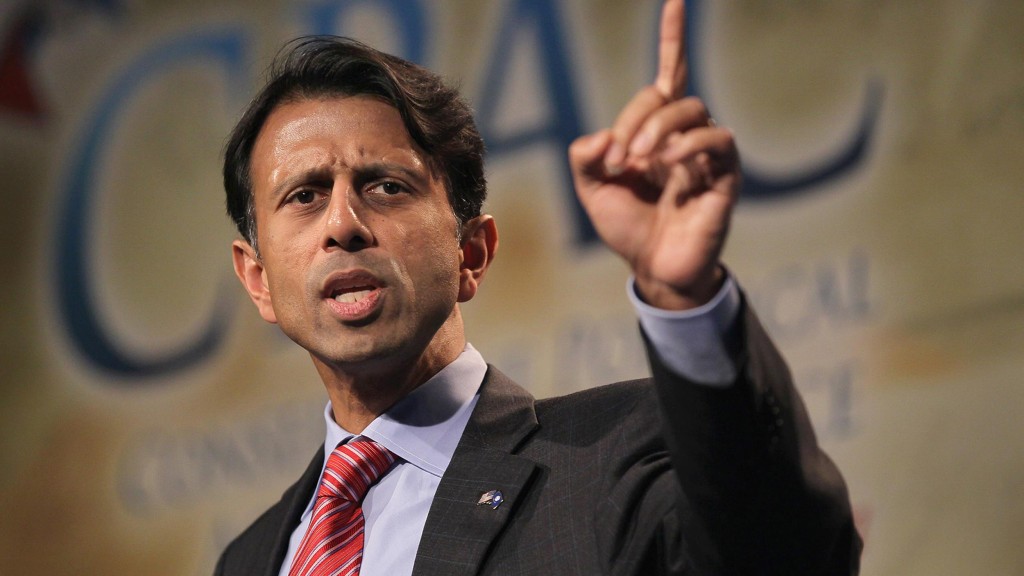
Louisiana Gov. Bobby Jindal is suggesting Jeb Bush is out of step with Republican principles in the party’s presidential race. Bush departs from some conservative Republicans with his policies on immigration and education. The former Florida governor has said GOP presidential candidates should be willing to “lose the primary to win the general” election. Jindal told The Associated Press on Monday that’s another way of saying Republicans should hide their beliefs in an effort to be more appealing to the media and Democratic voters. “We have tried that … we have lost.” Jindal said. “We need to embrace our principles.” Jindal’s comments came during a three-day campaign swing through New Hampshire, host of the first presidential primary. He’s struggling to gain traction in the big pack of candidates and part of his strategy centers on courting the religious wing of the Republican Party. Unlike in Iowa, religious conservatives do not make up a large part of the Republican voting bloc in New Hampshire. Jindal said he’ll make headway here by sticking to Republican principles and promoting his record as a two-term governor. Voters, Jindal said, want candidates who are honest and say what they really believe. Although Bush was the only Republican candidate Jindal mentioned by name, he did say the country needs a president with executive experience — a popular line for several governors seeking the nomination. “We don’t just need a talker … we’ve got a first-term senator in the White House who needed on-the-job training,” he said. “We can’t afford more of that.” Sens. Marco Rubio of Florida, Ted Cruz of Texas and Rand Paul of Kentucky are all running for president while serving their first Senate terms, as did Barack Obama on his way to the White House. When asked, Jindal said he disagrees with businessman Donald Trump‘s recent comments that Mexican immigrants are criminals and rapists, but declined to criticize Trump or his presidential candidacy further. Republished with permission of The Associated Press.
Ted Cruz, Mike Huckabee go head-to-head for evangelical votes
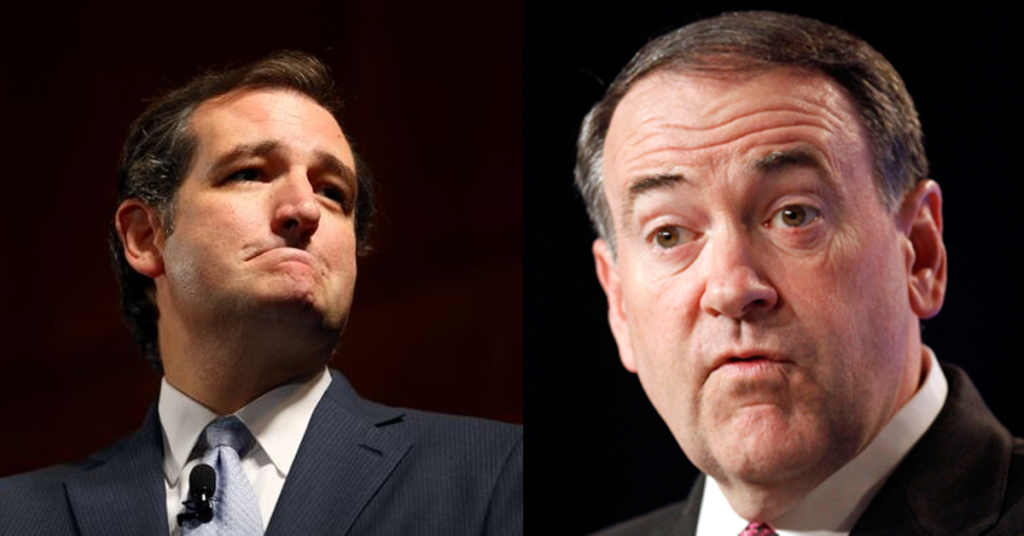
Republican presidential candidates Ted Cruz and Mike Huckabee went head-to-head for evangelical votes Sunday, telling a megachurch congregation in Georgia that God favors the United States but warning that the nation is on a perilous spiritual path because of actions like the Supreme Court decision legalizing same-sex marriage in all 50 states. Huckabee, who enjoyed evangelical support on his way to winning eight states in his 2008 White House bid, called the ruling “radical” and “illegal.” “I want to serve notice that the Supreme Court is just the supreme of the court system that is one of the three equal branches of government,” Huckabee told hundreds of members of Rock Springs Church in a rural area outside metro Atlanta. “It is not the supreme branch, and it most certainly is not the supreme being.” Cruz, the Texas senator, said a five-justice majority “ignored the text of the Constitution” and said the cascade of judicial and public support for same-sex marriage threatens religious liberty in America. He said he hopes the ruling “serves as a spark, to start a fire that becomes a raging inferno as the body of Christ stands up to defend the values that have built America.” Their appearance about 50 miles south of downtown Atlanta is part of the early, concerted scramble for the conservative evangelicals who remain an important bloc of the GOP presidential electorate. Christian conservatives have long held considerable influence in Iowa, which hosts the first caucus of the primary season, and in South Carolina, home of the South’s first primary a few weeks later. Now, Georgia and several other Southern states get more frequent visits from presidential hopefuls ahead of the planned “SEC primary,” named for the Southeastern Conference of college athletics. The March 1, 2016, vote falls after the traditional first four states and ahead of the usual “Super Tuesday” states. Huckabee, whose 2008 wins included Iowa and Georgia, has called the Southern-dominated primary date “manna from heaven.” But Cruz and others — Rick Santorum, Louisiana Gov. Bobby Jindal, retired neurosurgeon Ben Carson — are making hard runs for the same bloc of support. The Sunday event was a belated Independence Day observance that also featured The Charlie Daniels Band and Jep Robertson, one of the members of the cable television “Duck Dynasty” family. For Cruz and Huckabee, it might as well have been a county fair in Iowa, with an added opportunity to speak openly and passionately in their preferred evangelical tones. Cruz told the story of an Iowa couple he said were driven out of the wedding chapel business after denying their services to two men who wanted to get married. The case, Cruz said, “is emblematic of the persecution that religious liberty and believers across this country.” He continued: “I will always, always, always stand and defend the religious liberty of every American.” Huckabee said the Independence Day observances were an opportunity to reject “the revisionists” who say of the American founders: “They really were not believers.” The ordained Baptist minister argued: “There is simply no other explanation … God had to bless America or we would not exist. The question is will God continue to bless America without our repentance.” The Rev. Benny Tate, pastor of the 6,000-member Rock Springs congregation, joked about the attention. “Our zip code is E-I-E-I-O,” he said, “and we’ve got two presidential candidates. How about that?” But the minister is also a serious player in Republican politics, with many Georgia politicians, and now national ones, courting his public approval, if not his explicit endorsement. Tate told the assembly that Huckabee, as Arkansas governor, signed “a ban on partial-birth abortion,” referring to the termination of late-term pregnancies. He hailed Cruz for “standing against the Democratic Party … and even against the Republican Party.” Despite the emphasis on faith, Huckabee’s loudest applause came when he lauded his “fair tax” proposal that he said “would allow us to, once and for all, abolish the IRS.” Cruz, meanwhile, drew some of his most enthusiastic reactions when he declared, “I’m convinced 2016 will be a referendum on repealing Obamacare,” President Barack Obama‘s signature health care law. A few minutes earlier, the assembly passed offering plates for the church’s clinics, which Tate said provide “free health care” to residents in dozens of surrounding counties. Republished with permission of The Associated Press.
Presidential primary brief: 498 days until Election Day
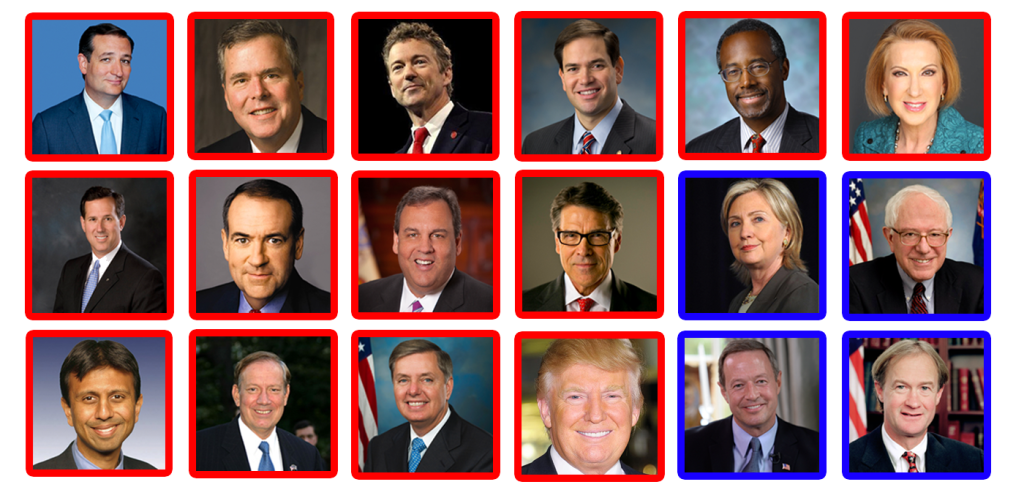
Welcome to the Monday presidential primary brief provided by Alabama Today. Every week you can find your latest headlines on the presidential primary races as we count down the days until Election Day. 245 days until AL Presidential Primary 498 days until Election Day Convention Dates: Republican July 18-21 2016, Democratic July 25-28 2016 Weekly Headlines: Bush leads in N.H. poll, Trump is second WSJ/NBC national poll shows Hillary Clinton crushing all rivals Bobby Jindal announces entry into 2016 presidential race Press Clips: Chris Christie Launches Campaign Website Three Days Before His Announcement (National Journal 6/27/15) If the trips to New Hampshire and leaked announcement invitations weren’t big enough clues, Chris Christie is in for 2016. Like several other campaigns this cycle, Christie’s team went for a digital-first approach ahead of a formal announcement: The New Jersey governor launched a campaign website Saturday, just three days before he’s expected to announce his White House bid from the gym of the Livingston high school where he graduated. He signaled the site’s launch in a series of tweets Saturday morning. New Poll: Bernie Sanders closing in on Hillary Clinton (The Blaze 6/26/15) With the progressive wind at his back, Vermont Sen. Bernie Sanders is emerging as the most viable Democratic challenger, at least in New Hampshire, to former Secretary of State Hillary Clinton for the Democratic presidential nomination. A WMUR/CNN poll released Thursday evening shows Sanders has narrowed the gap between him and Clinton from 21 percentage points to just 8 points in less than two months, for a Clinton lead of 43 percent to 35 percent. The poll was taken from 360 likely Democratic voters from June 18 to June 24. A year ago, Clinton trounced Sanders by 59 percent to 5 percent. 2016 candidates react to Supreme Court’s gay marriage ruling (NBC News 6/26/15) The Supreme Court’s landmark decision that all states must issue marriage licenses to same-sex couples prompted a flood of responses on Friday morning, including from those eyeing the White House in 2016. Reaction from the presidential hopefuls poured in almost immediately after the decision was announced. Democratic presidential frontrunner Hillary Clinton tweeted just moments after the news broke that she’s proud to celebrate the “historic victory.” Here’s what climate hawk Martin O’Malley would do as president (Grist 6/25/15) Say what you will about Martin O’Malley, the former Maryland governor and current Democratic presidential candidate, but the man is a wonk. He may lack for narrative, but he will give you plenty of commonsense solutions. And he has a demonstrated commitment to combating climate change. So perhaps it should come as no surprise that despite his lagging far behind Hillary Clinton and even lefty Sen. Bernie Sanders (I-Vt.) in the polls, he is the first candidate to produce anything resembling a detailed climate policy. It’s only a work in progress, and it isn’t even available yet on the campaign website. But O’Malley’s team shared with Grist a white paper outlining some significant climate change policy proposals. Collectively, they would go further than President Obama has — or than Hillary Clinton has called for thus far. State Dept. gets Libya emails that Hillary Clinton didn’t hand over (NY Times 6/25/15) The State Department said on Thursday that 15 emails sent or received by Hillary Rodham Clinton were missing from records that she has turned over, raising new questions about whether she deleted work-related emails from the private account she used exclusively while in office. The disclosure appeared to open the door for Republicans on Capitol Hill to get more deeply involved in the issue. Senator Lindsey Graham, Republican of South Carolina, who is running for president, said he planned to send a series of questions to the State Department about the missing emails and about why it allowed her to use the personal account. Scott Walker to announce 2016 intentions next month (CBS News 6/25/15) Wisconsin Gov. Scott Walker will make his presidential intentions known the week of July 13, he said on Fox News Thursday night. In a crowded field of more than a dozen Republican candidates, Walker’s standing in the 2016 polls is relatively decent, so far. In a recent Fox poll of likely Republican voters, Walker tied for fourth place. A recent NBC/ Wall Street Journal poll put him in second place. The two-term governor has gained a reputation as a staunch conservative after successfully taking on unions in his state and pushing an often polarizing conservative agenda. Walker told Fox’s Greta Van Susteren that he would bring that same moxie to Washington, should he decide to run. 2016 contenders react to Obamacare ruling (Politico 6/25/15) Here’s how the 2016 presidential contenders reacted on Twitter to the Supreme Court’s decision to uphold a major component of the Obamacare health law: Fox News Poll: Bush, Trump score post-announcement bumps (Fox News 6/24/15) There’s been a lineup change in the race for the GOP nomination, as businessman Donald Trump moves up after declaring his candidacy. He’s now second in the order after former Florida Gov. Jeb Bush, who also got an uptick in support after his formal announcement. For Democrats, former Secretary of State Hillary Clinton is still — by far — the team leader, according to a new Fox News national poll on the 2016 presidential election. After son’s death, Biden not ruling out 2016 bid (CNN 6/22/15) As Vice President Joe Biden slowly returns to official duties in Washington following his son’s death, a decision on mounting a third presidential bid looms in the not-so-distant future. In just more than a month, Biden will determine whether or not to make another go at the top job. And while many Democrats say they’re doubtful he will launch a presidential campaign, his supporters are holding out hope he decides to challenge Hillary Clinton for the Democratic nomination. As he steps back into public life, Biden has set an early August deadline for making his intentions known, said a Democrat familiar with his thinking. Before his son’s death, Biden consistently said he
2016 Presidential candidates react to supreme court ruling on same-sex marriage
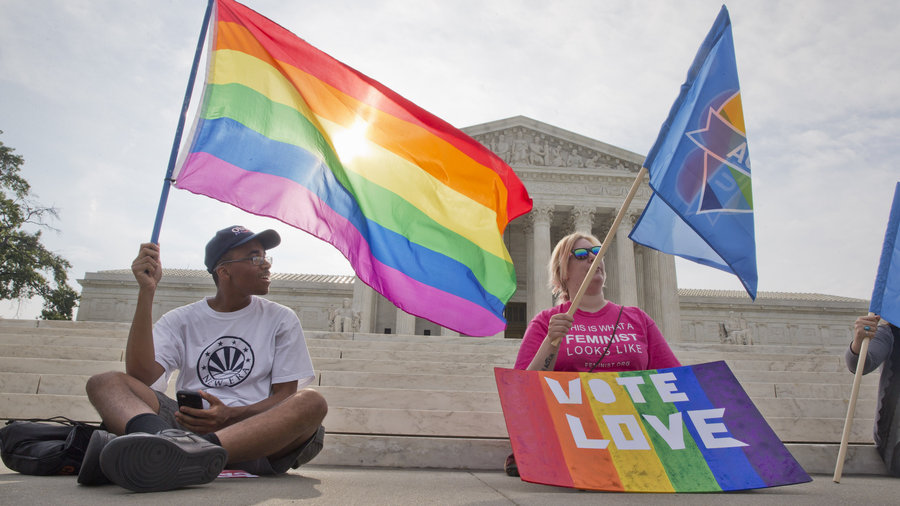
On Friday, in a 5-4 ruling the U.S. Supreme Court gave same-sex couples the right to marry in the United States. Although Lesbian and Gay couples can already marry in 36 states the U.S. Supreme Court’s ruling means the other 14 states must stop enforcing their bans on same-sex marriage. The 2016 presidential hopefuls were quick to weigh in with their opinions on the decision. Here’s a compilation of the candidates reactions: Former Gov. Jeb Bush: Guided by my faith, I believe in traditional marriage. I believe the Supreme Court should have allowed the states to make this decision. I also believe that we should love our neighbor and respect others, including those making lifetime commitments. In a country as diverse as ours, good people who have opposing views should be able to live side by side. It is now crucial that as a country we protect religious freedom and the right of conscience and also not discriminate. Ben Carson: While I strongly disagree with the Supreme Court’s decision, their ruling is now the law of the land. I call on Congress to make sure deeply held religious views are respected and protected. The government must never force Christians to violate their religious beliefs. I support same-sex civil unions but to me, and millions like me, marriage is a religious service — not a government form. Lincoln Chafee: Congratulations to Supreme Court on today’s good ruling for marriage equality! Hillary Clinton: “Today is one of those days we’ll tell all our grandchildren about,” “This is our country at its best: inclusive, open and striving towards true equality,” wrote Clinton. Read more here Carly Fiorina: This is only the latest example of an activist Court ignoring its constitutional duty to say what the law is and not what the law should be. Justice Alito spoke for so many of us when he said that “[t]oday’s decision usurps the constitutional right of the people to decide whether to keep or alter the traditional understanding of marriage … All Americans, whatever their thinking on that issue, should worry about what the majority’s claim of power portends.” The Court ruled today that all Americans should receive equal benefits and rights from the government under the law. I have always supported this view. However, this decision was also about the definition of marriage itself. I do not agree that the Court can or should redefine marriage. I believe that responsibility should have remained with states and voters where this conversation has continued in churches, town halls and living rooms around the country. Moving forward, however, all of our effort should be focused on protecting the religious liberties and freedom of conscience for those Americans that profoundly disagree with today’s decision. The Court did not and could not end this debate today. Let us continue to show tolerance for those whose opinions and sincerely held beliefs differ from our own. We must lead by example, finding a way to respect one another and to celebrate a culture that protects religious freedom while promoting equality under the law. Former Gov. Mike Huckabee: The Supreme Court has spoken with a very divided voice on something only the Supreme Being can do-redefine marriage. I will not acquiesce to an imperial court any more than our Founders acquiesced to an imperial British monarch. We must resist and reject judicial tyranny, not retreat. This ruling is not about marriage equality, it’s about marriage redefinition. This irrational, unconstitutional rejection of the expressed will of the people in over 30 states will prove to be one of the court’s most disastrous decisions, and they have had many. The only outcome worse than this flawed, failed decision would be for the President and Congress, two co-equal branches of government, to surrender in the face of this out-of-control act of unconstitutional, judicial tyranny. The Supreme Court can no more repeal the laws of nature and nature’s God on marriage than it can the law of gravity. Under our Constitution, the court cannot write a law, even though some cowardly politicians will wave the white flag and accept it without realizing that they are failing their sworn duty to reject abuses from the court. If accepted by Congress and this President, this decision will be a serious blow to religious liberty, which is the heart of the First Amendment. Louisiana Gov. Bobby Jindal: The Supreme Court decision today conveniently and not surprisingly follows public opinion polls, and tramples on states’ rights that were once protected by the 10th Amendment of the Constitution. Marriage between a man and a woman was established by God, and no earthly court can alter that. This decision will pave the way for an all out assault against the religious freedom rights of Christians who disagree with this decision. This ruling must not be used as pretext by Washington to erode our right to religious liberty. The government should not force those who have sincerely held religious beliefs about marriage to participate in these ceremonies. That would be a clear violation of America’s long held commitment to religious liberty as protected in the First Amendment. I will never stop fighting for religious liberty and I hope our leaders in D.C. join me. Former Gov. Martin O’Malley: So grateful to the people of MD for leading the way on this important issue of human dignity and equality under the law. Former Gov. Rick Perry: I am disappointed the Supreme Court today chose to change the centuries old definition of marriage as between one man and one woman. I’m a firm believer in traditional marriage, and I also believe the 10th Amendment leaves it to each state to decide this issue. I fundamentally disagree with the court rewriting the law and assaulting the 10th Amendment. Our founding fathers did not intend for the judicial branch to legislate from the bench, and as president, I would appoint strict Constitutional conservatives who will apply the law as written. Sen. Marco Rubio: I believe that marriage, as the key to strong family life,
2016 presidential hopefuls react to SCOTUS Obamacare ruling
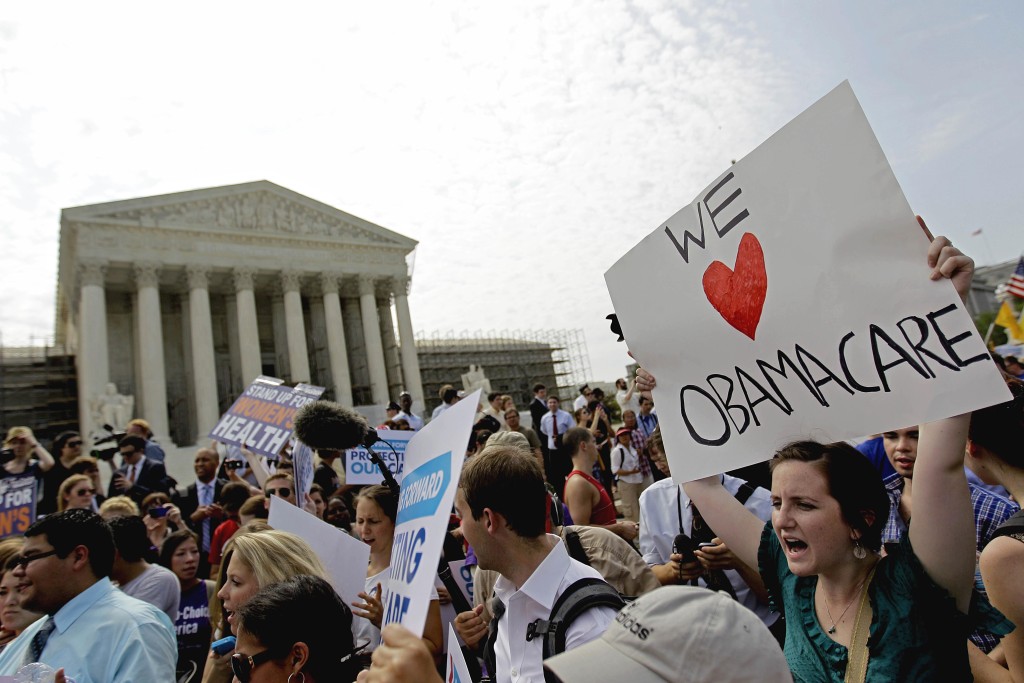
In the wake of Thursday’s Supreme Court ruling in favor of a key part of President Barack Obama‘s signature health care law on Thursday, 2016 presidential hopefuls were quick to weigh in with their opinions of the 6-3 decision. Here’s a compilation of how the candidates reacted to the SCOTUS Obamacare ruling: Former Florida Gov. Jeb Bush: I am disappointed by today’s Supreme Court ruling in the King v. Burwell case. But this decision is not the end of the fight against Obamacare. This fatally flawed law imposes job-killing mandates, causes spending in Washington to skyrocket by $1.7 trillion, raises taxes by $1 trillion and drives up health care costs. Instead of fixing our health care system, it made the problems worse. As president of the United States, I would make fixing our broken health care system one of my top priorities. I will work with Congress to repeal and replace this flawed law with conservative reforms that empower consumers with more choices and control over their health care decisions. Ben Carson: Obamacare fundamentally increases the power of the government over the people and healthcare providers. While I resent what the court has done, it only causes me to work even harder to make sure the next president will repeal and replace Obamacare with sensible consumer empowering solutions that remove the government from the patient/doctor relationship. Those of us who pledge to repeal Obamacare must redouble our efforts and not waste time and energy mourning today’s ruling. Hillary Clinton: I applaud the Supreme Court’s decision to affirm what the authors of the Affordable Care Act clearly intended and wrote into law: that health insurance should be affordable and available in every state across the country. Republicans in Congress have waged a sustained attack against this promise. They’ve voted more than 50 times to repeal or dismantle the law, roll back coverage for millions of Americans, and let insurers write their own rules again – all without proposing any viable alternatives. Now that the Supreme Court has once again re-affirmed the ACA as the law of the land, it’s time for the Republican attacks to end. It’s time to move on. Read more here Sen. Ted Cruz: Today’s decision in King v. Burwell is judicial activism, plain and simple. For the second time in just a few years, a handful of unelected judges has rewritten the text of Obamacare in order to impose this failed law on millions of Americans. The first time, the court ignored federal law and magically transformed a statutory ‘penalty’ into a ‘tax.’ Today, these robed Houdinis transmogrified a ‘federal exchange’ into an exchange ‘established by the state.’ As Justice Scalia rightfully put it, ‘Words no longer have meaning if an exchange that is not established by a state is ‘established by the state.” He also said, ‘We should start calling this law SCOTUSCare’ – I agree. Carly Fiorina: Obamacare has not lived up to what we were promised. Instead of allowing those with insurance to stay on the plans they knew and liked, millions of people have been compelled to buy health plans that they didn’t want. Many have been forced to move to Medicaid and yet more doctors are refusing to take Medicaid patients under this law. We were promised improved access and higher-quality care, but the complexity of ObamaCare is preventing the very competition that would allow more and better options for patients. Instead, hospitals, drug companies, and insurance companies are all consolidating. The lasting solution here is what we’ve been saying all along. We need to repeal ObamaCare. Sen. Lindsey Graham: If you want to repeal and replace Obamacare with something better for your family—bipartisan—vote Republican. Former Gov. Mike Huckabee: Today’s King v. Burwell decision, which protects and expands ObamaCare, is an out-of-control act of judicial tyranny,” Huckabee said in a statement. “Our Founding Fathers didn’t create a ‘do-over’ provision in our Constitution that allows unelected, Supreme Court justices the power to circumvent Congress and rewrite bad laws. The Supreme Court cannot legislate from the bench, ignore the Constitution, and pass a multi-trillion dollar ‘fix’ to ObamaCare simply because Congress misread what the states would actually do. The architects and authors of ObamaCare were intentional in the way they wrote the law. The courts have no constitutional authority to rescue Congress from creating bad law. The solution is for Congress to admit they screwed up, repeal the ‘nightmare of Obamacare’, and let states road-test real health care reforms. Gov. Bobby Jindal: Today, the Supreme Court had its say; soon, the American people will have theirs. President Obama would like this to be the end of the debate on Obamacare, but it isn’t. Now that the Supreme Court has ruled, the debate will grow. Conservatives must be fearless in demanding that our leaders in Washington repeal and replace Obamacare with a plan that will lower health care costs and restore freedom. Former Gov. Martin O’Malley: The Affordable Care Act has helped more than 17 million Americans access quality and affordable health coverage. Now that the Supreme Court has, once again, upheld the Affordable Care Act, we must continue to build and improve upon this hard-won progress. With the national goal of universal coverage now affirmed, we must reduce costs by improving wellness. Innovations for better coordinated care, personalized medicine, and the alignment of profit incentives to promote wellness make all of this possible. Sen. Rand Paul: This decision turns both the rule of law and common sense on its head. Obamacare raises taxes, harms patients and doctors, and is the wrong fix for America’s health care system. As President I would make it my mission to repeal it, and propose real solutions for our healthcare system. As a physician I know Americans need a healthcare system that reconnects patients, families, and doctors, rather than growing government bureaucracy. Former Gov. Rick Perry: The Obama Administration has ignored the text of the Affordable Care Act time and again, and today’s ruling allows them to continue to disregard the letter of the law. While I disagree with
GOP almost set for ’16, with only 3 governors left to get in race
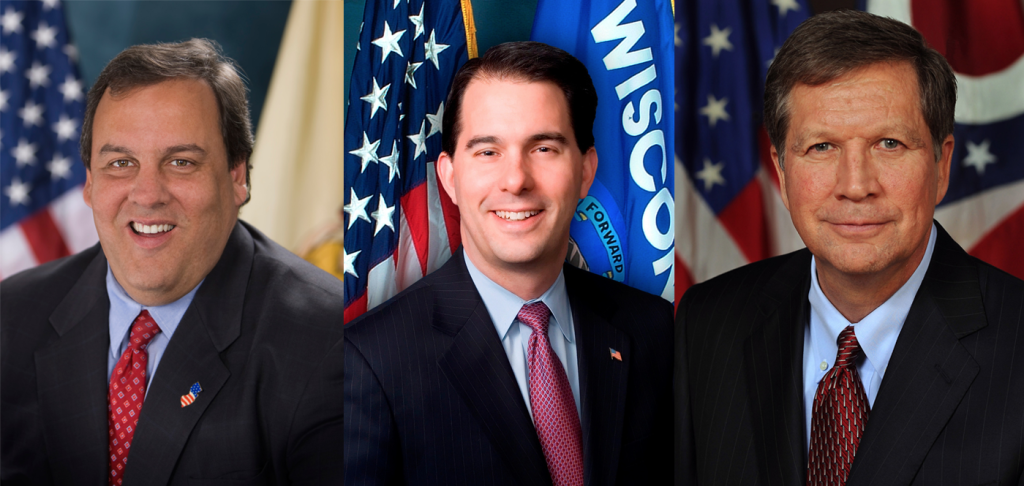
There was a time in Republican presidential politics when Chris Christie was a star, Scott Walker a mystery and John Kasich a memory. Oh, how things can change. Today, they are the last of the GOP’s undeclareds – a trio of ambitious governors whose fortunes have shifted dramatically in recent months, illustrating why it’s far too early to count anyone out in the GOP’s crowded and unruly White House race. “Does anyone remember me?” Kasich, who first ran for president more than a decade ago, said Wednesday as he looked out at a crowd of roughly 200 people gathered for his first Iowa appearance in years. “I’m shocked.” With Louisiana’s Gov. Bobby Jindal formally launching his presidential bid on Wednesday, 13 high-profile Republicans have officially entered the campaign for the party’s 2016 nomination. Only three major prospects remain: Ohio’s Kasich, Wisconsin’s Walker and New Jersey’s Christie, each planning to announce his intentions in the coming weeks. They are expected to join a field with five sitting or former senators, five current or former governors, two business leaders and a retired neurosurgeon. The “in or out” phase of the Republican presidential race is nearing its end, but with just over seven months until Iowa’s leadoff caucuses, no clear leader has emerged in the race for the nomination. “There’s so many candidates, it’s almost impossible for the average person to keep track,” said tea party leader Mark Meckler, who heads up the conservative group Citizens for Self-Governance. Yet the uncertainty in the race has as much to do with one candidate as any other: former Florida Gov. Jeb Bush. The son of one president and brother of another had hoped to overwhelm his Republican competitors by raising tens of millions of dollars and assembling top staff talent during the first half of this year. While aides say Bush’s fundraising has been impressive, he has struggled to break out in early polls, leaving room for party activists on the ground in early-voting states to consider new faces. Kasich is a new face only for those who don’t remember that, 16 years ago, he was a challenger to another presidential candidate named Bush. The 63-year-old Republican governor and former congressman ran a short-lived bid that was quickly dashed by Bush’s older brother, then-Texas Gov. George W. Bush. The often-blunt Kasich says he’s seriously looking at 2016 largely because of Jeb Bush’s inability to match his brother’s dominance, leaving room for a dark-horse candidacy such as his own to catch on. It doesn’t hurt that he posted an overwhelming re-election victory in 2014 in one of the nation’s premier swing states. “Everybody has a place. Everybody can rise,” Kasich said Wednesday, echoing a central theme of Bush’s candidacy. “It’s who delivers the biggest message and who can touch people’s hearts.” Christie, meanwhile, has almost been reduced to an afterthought due to lingering questions about his personality and political baggage following the George Washington Bridge scandal. And while he and Kasich lack Bush’s stacked bank account, they represent perhaps the most direct threat to Bush among those in the race. All three appeal to the party’s more moderate voters. Kasich and Christie were among the few Republican governors to expand Medicaid eligibility as part of President Barack Obama‘s health care law, they have prioritized treatment for drug addicts and the mentally ill, and both have shown a willingness to stand up to those in the farthest reaches of the party’s conservative base. Christie was once considered an early front-runner in the 2016 race, having passed on a bid in 2012. His backers have little doubt that he’s in, as he’s been raising money for both a political action committee and a super PAC, delivering meaty policy speeches and paying visits to key early-voting states – most notably New Hampshire. Kasich and Christie pose a particular challenge to Bush in the nation’s first presidential primary state, which typically favors pragmatic leaders over party ideologues. While Kasich made his first trip to Iowa since 1999 this week, he has been a regular to visitor to New Hampshire in recent months. And underscoring the importance of the state, a person familiar with Christie’s planning says his team has considered setting his official announcement there in an event that could come as early as next week. The person spoke to The Associated Press on condition of anonymity to discuss the topic ahead of Christie’s formal announcement. Walker, meanwhile, has surged into the top tier of his party’s presidential hopefuls after impressing Republicans in Iowa earlier this year, yet he remains largely unknown beyond his base in the Midwest and party activists. Some Republicans see him as having the ability to unite the GOP’s more conservative and moderate wings, and he has said his announcement will come in early- to mid-July. The question for all, Meckler said, is whether they can stand out. “Even knowing who’s in the field is becoming more and more difficult,” Meckler said. Republished with permission of The Associated Press.
Bobby Jindal poised to announce presidential campaign
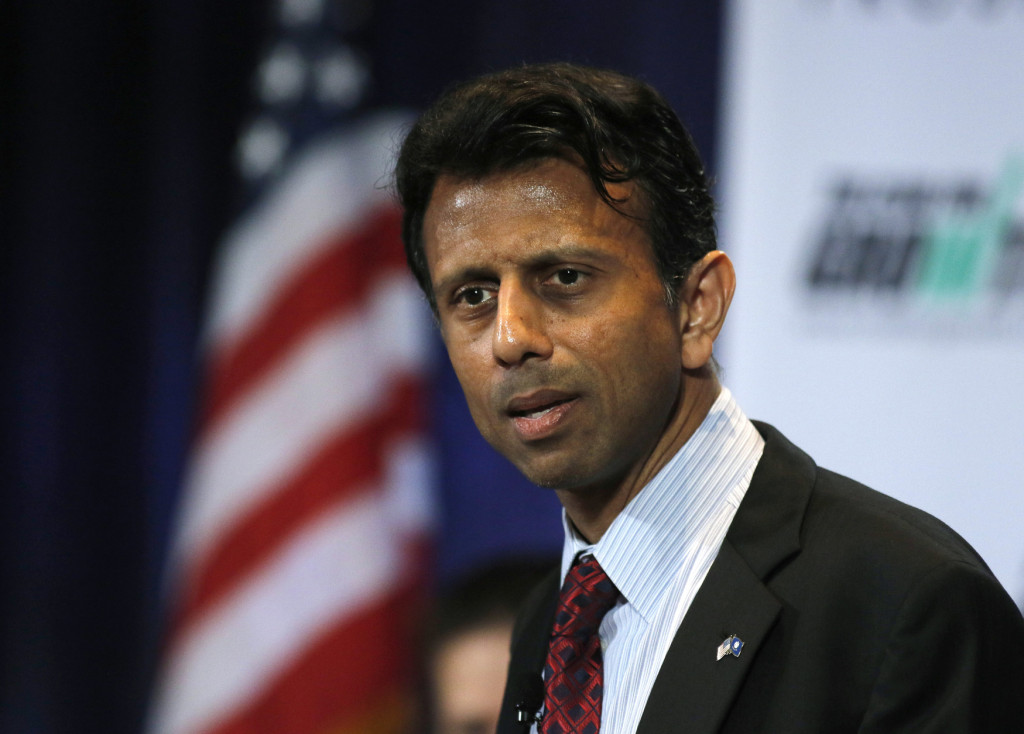
Louisiana Gov. Bobby Jindal appears ready to launch a long-shot campaign for the Republican presidential nomination that rests on courtship of evangelical voters and his reputation as a man of ideas. The 44-year-old, two-term governor begins without the national prominence of rivals such as Florida Sen. Marco Rubio and former Florida Gov. Jeb Bush, who are among a dozen contenders for the nomination in a highly competitive pack. But Jindal, an Oxford-educated son of Indian immigrants, points to a long political career filled with many unexpected achievements. He talked a governor into appointing him health secretary at age 24 with little background in either health management or government, won election to Congress at 32 and became governor four years later. “If I were to become a candidate, I would certainly run to win and I would do it based on presenting detailed ideas about how to move our country forward,” Jindal told reporters recently. His expected campaign launch was scheduled Wednesday afternoon in the New Orleans suburb of Kenner, where Jindal lived as a congressman. Unpopular at home, the Louisiana governor waited until the state legislative session had ended and lawmakers found a way to close a $1.6 billion budget gap before scheduling the announcement. But he has been building his campaign for months with frequent trips to key presidential voting states, particularly Iowa, where he’s focused heavily on Christian conservatives. Raised a Hindu but a convert to Catholicism as a teenager, Jindal has talked of his religious faith in small churches across Louisiana. As he readied his presidential campaign, the governor held a prayer rally in Baton Rouge, met pastors across several states and put out an executive order to grant special “religious freedom” protections to people in Louisiana who oppose same-sex marriage. He’s competing, however, with several contenders trying to appeal to the same pool of evangelical voters, including Texas Sen. Ted Cruz and former Arkansas Gov. Mike Huckabee. As he approached his announcement, Jindal also showcased more of the policy wonk reputation that got him elected governor, rather than focusing solely on the culture wars. He’s drawn distinctions from other GOP contenders by noting he’s published “detailed plans” on health care, defense, education and energy policy. He’s suggested governors are better equipped to become president because they’ve run state bureaucracies, balanced budgets and implemented policy. That’s an argument, however, that other White House hopefuls are making or can: Govs. Scott Walker of Wisconsin, Chris Christie of New Jersey and John Kasich of Ohio, as well as Bush. “We need somebody who will go to D.C. and rescue the American Dream from becoming the European nightmare,” Jindal says. All told, a path to victory remains difficult for Jindal. GOP debates begin in August and it’s unclear if he will make the cut if based on standing in national polls. What is certain is that the term-limited governor has worn out his welcome back home as his tenure approaches its end in January. Jindal’s approval ratings in Louisiana have dropped into the low 30s due to repeated budget cuts to public colleges, near-constant state financial problems and a sense that he’s crafted state policy based on his national political ambitions. The governor dismisses the low state poll numbers as a sign he’s tackled difficult problems, with large shifts in education policy, dramatic reductions to the public sector workforce and the right-sizing of government. “Making changes is tough,” he said in a recent interview. “It’s easy to be a popular politician. If you want to be a popular politician, you kiss babies, you cut ribbons, you don’t make tough choices. That’s not what I got elected to do.” Republished with permission of The Associated Press.
Alabama’s unemployment rate stable at 6.1 percent
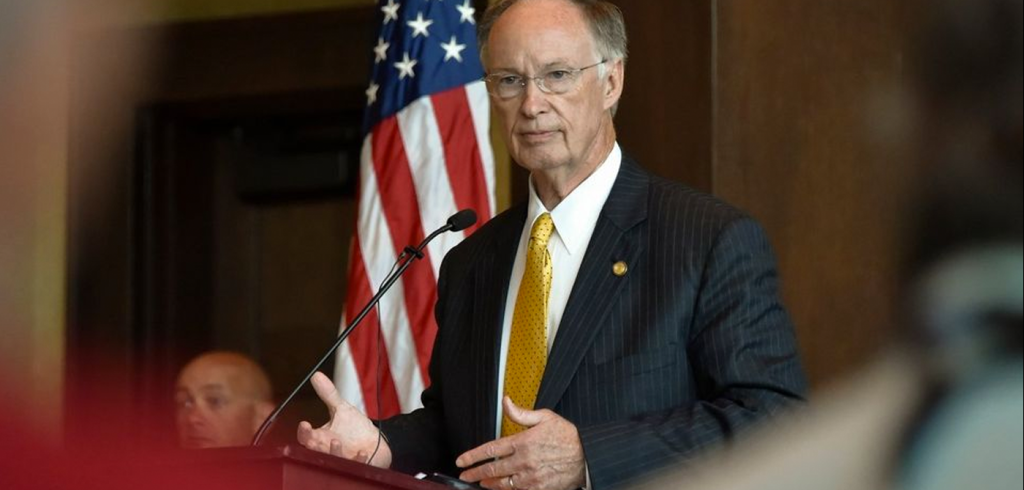
According to the office of Gov. Robert Bentley and state Labor Commissioner Fitzgerald Washington, Alabama is making gains in key economic indicators, despite a small increase in the gross unemployment rate. Unemployment in the Yellowhammer State is running at a seasonally adjusted rate of 6.1 percent. That’s a good thing, argued Washington in a news release issued Friday, “Although we experienced an increase in our unemployment rate this month, the news is not bad,” Washington said. “Both employment measures (wages and job growth) registered gains, which is clear evidence that Alabamians are going back to work. We haven’t seen wage and salary employment this high in May since 2008. Additionally, household employment also increased by more than 47,000 since last year.” According to the governor’s office, the gains were primarily located in the “professional and business services” sector and (things like tax preparation and legal counsel, which accounted for 2,700 new jobs), followed by hospitality and leisure (up 1,900 jobs) and commercial and utility concerns (up 1,700 positions). The 6.1 percent figure is compared to a 5.5 percent unemployment rate nationally and an April unemployment rate of 5.5 Jobless rates were slightly lower in neighboring Florida (5.7 percent) and slightly higher in Georgia, which also experienced a slight increase up to 6.3 percent. Under the Bentley administration, Alabama has more or less consistently bested both Georgia and neighboring Louisiana, which recorded a 6.6 percent unemployment rate for the third straight month as Gov. Bobby Jindal-driven initiatives seem to be falling flat. Bentley in his Friday statement portrayed the situation as solid, but with plenty of room to improve. It mirrors the nation as a whole in that regard. “We continue to see decreases in Alabama’s unemployment rate, and increases in both of our employment measures, which is a testament to the strong economic development efforts we have prioritized,” Bentley said. “We have gone 16 months with no increase in our unemployment rate. This steady progress is further evidence that, as far as employment indicators go, Alabama has regained its pre-recession standing. My priority as governor remains job creation, and I will continue my effort until every Alabamian who wants a job has the opportunity to have one.”
High stakes for Jeb Bush, Marco Rubio in Florida presidential primary
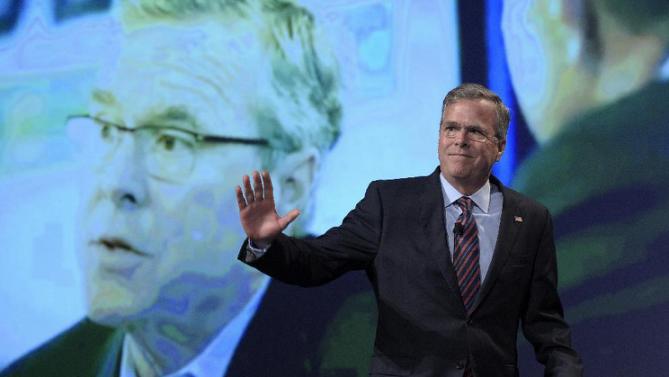
Leading Republican presidential prospects faced off at an event Tuesday in battleground Florida, a state that could prove pivotal to the Florida heavyweights seeking the nomination, not to mention any rival who manages to win here instead. Jeb Bush, a former two-term Florida governor, and Florida’s junior Sen. Marco Rubio, were the home-state stars at a GOP economic gathering that drew a half dozen White House hopefuls to a Disney World convention center – Rubio, tied up by Senate business, appeared by video. They are so heavily favored in the March 15 primary next year that some rivals are considering bypassing Florida’s race. But they showed up Tuesday. Rubio offered the audience an indirect but unmistakable barb at Bush, who spoke later. “While our economy is transforming, our policies and our leaders are not,” Rubio said. “Our outdated leaders continue to cling to outdated ideas.” The 44-year-old Republican did not name Bush or Democrat Hillary Rodham Clinton. But the implication was clear in a 2016 campaign that contrasts a group of younger political leaders and the two older figures whose families have dominated national politics for decades. “It’s kind of hard to imagine that my good friend, Marco, would be critical of his good friend, Jeb,” a sarcastic Bush said with a smile after acknowledging to reporters there would be “elbows and knees” thrown in the race. “This isn’t Tiddlywinks we’re playing.” He continued: “If I’m a candidate, I want to be the guy to beat.” Tuesday’s speaking program also featured former Arkansas Gov. Mike Huckabee, former Texas Gov. Rick Perry, Wisconsin Gov. Scott Walker, New Jersey Gov. Chris Christie and Louisiana Gov. Bobby Jindal. Despite their appearance, many campaigns are weighing whether to spend time and money in the state Bush and Rubio call home. Other than the Florida pair, none who showed up Tuesday has begun to establish teams of operatives and activists on the ground in Florida. Many are already working to temper expectations, while realizing they cannot ignore Florida altogether – both for its abundance of wealthy donors and its status as a must-win swing state in the general election. Wisconsin Gov. Scott Walker tried to walk back recent comments he might avoid the Florida primary should he run for president. Bush and Rubio “certainly would have a competitive advantage,” he said. “But if I didn’t think I could compete, I wouldn’t be here today.” He ticked off a list of personal and political connections to Florida. Florida could be decisive in the Republican race. The Florida Legislature recently moved the state’s primary to March 15, the earliest date the Republican National Committee allows for states that award all of their delegates to the primary winner. States voting before then must award their delegates proportionately. The shift was seen as a move to help Bush or Rubio, one of whom would claim the state’s trove of delegates by winning Florida. Even so, with other states voting first, nearly half of the delegates needed to clinch the nomination will have already been awarded by the time Florida voters weigh in. That makes Florida particularly important for Bush or Rubio. Other contenders, Perry and Huckabee among them, are shaping a strategy focused on early-voting states such as Iowa and South Carolina, hoping to build momentum that could translate down the line in Florida. Bush and Rubio are by no means guaranteed a Florida victory. They face strong competition in the earlier states. And Brian Ballard, who led Florida fundraising for John McCain and Mitt Romney, said “a lot of guys are in striking distance” of Rubio and Bush even in Florida. The demands of competing in Florida will require tough choices by the larger field. It costs about $1.5 million a week to run statewide television ads, far more than in New Hampshire, Iowa and South Carolina. “Florida’s an expensive state, it’s a winner-take-all state, and how much of your resources you dedicate to it is a nightmare decision for the operatives and those who advise the candidates,” said former Florida GOP chairman Al Cardenas, now a Bush supporter. Yet, as Tuesday’s event showed, top-tier candidates will not ignore Florida altogether in the coming months. Huckabee reminded Florida voters that Bush and Rubio aren’t the only Florida residents in the race. The former Arkansas governor now lives in the Panhandle, and referred to himself as “someone who is like a lot of other people in America – now a Floridian.” He also heaped praised on Gov. Rick Scott‘s economic leadership, acknowledging an ulterior motive: “Anything I could do to suck up to him and his donors by God I’m going to do,” Huckabee said with a smile. Republished with permission of the Associated Press.


